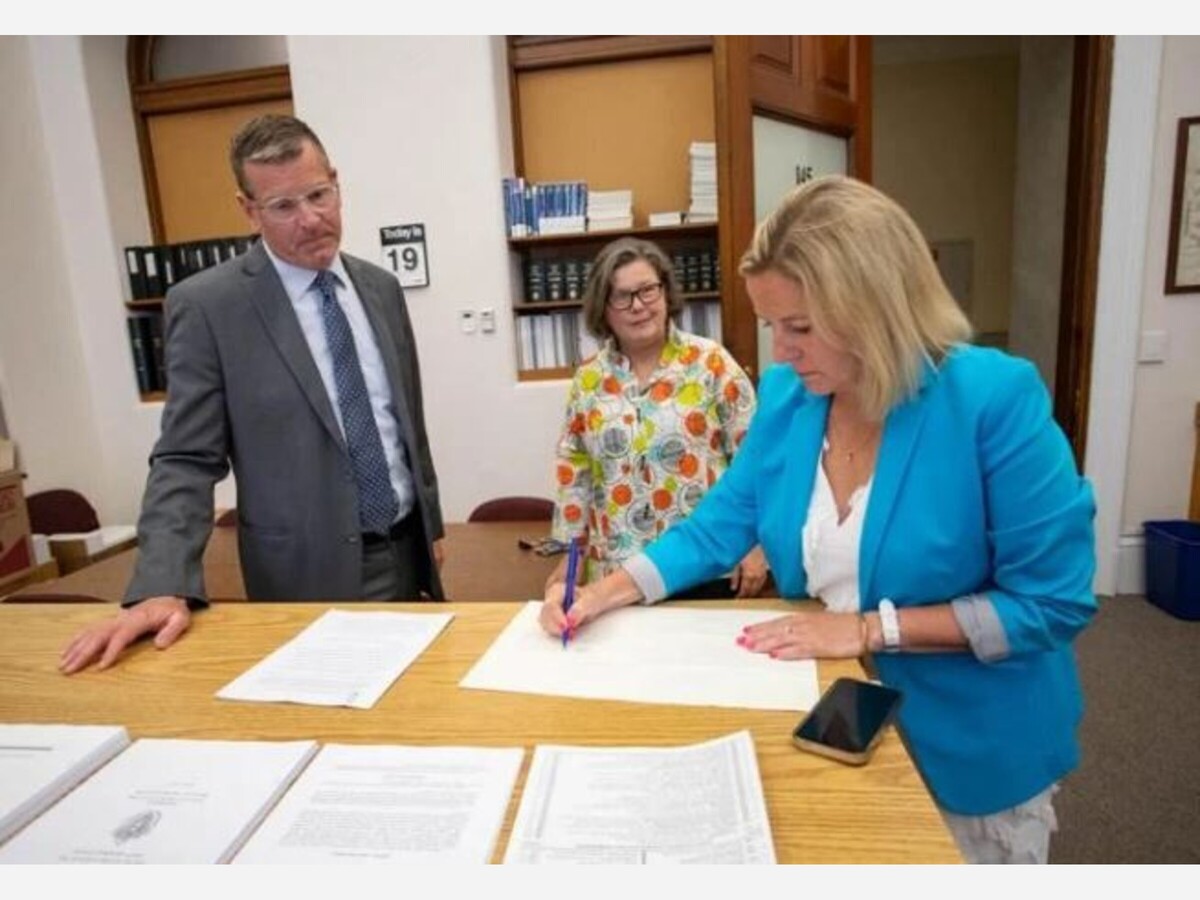Image


Rep. Danielle Gregoire (right), one of the lawmakers who negotiated a final text for a $1.2 billion information technology bond bill, signs her name to the House-Senate accord on Friday, July 19, 2024 alongside conference committee co-chairs Rep. Michael Finn (left) and Sen. Joanne Comerford (center).
Conference committees negotiating pay equity legislation and a $1.2 billion info-tech bond bill each filed their House-Senate accords around 3 p.m. Friday in the House clerk's office, teeing up both measures for votes this week.
Speaker Ronald Mariano's office told the News Service that the House will take up both conference reports at its next formal session, which is currently scheduled for Wednesday.
Both branches gaveled out for the weekend before 4 p.m. Friday after taking final enactment votes on the fiscal 2025 general budget.
An updated House schedule shared at 2:59 p.m. calls for an informal session Monday, formal sessions on Wednesday and Thursday, and a potential formal session on Friday, July 26. The Senate plans to hold an informal session Monday, followed by formal sessions Wednesday and Thursday, according to a schedule shared at 3:56 p.m.
The wage transparency legislation (H 4890), which has been championed by advocates including former Lt. Gov. Evelyn Murphy, calls for employers with 25 or more employees to post pay ranges alongside job openings. The bill would also require employers with more than 100 employees to file copies of federally-required equal employment data with the state secretary's office, which would then be forwarded to the Executive Office of Labor and Workforce Development.
"An employee would be allowed to request the pay range for their current position. Studies show that women and people of color under value their own work. These actions would ensure that people know the value of their labor and can negotiate for better pay with access to better information," lead conferees Rep. Danielle Gregoire and Sen. Patricia Jehlen said in a statement. They added, "The bill also includes new data collection provisions to help identify gender and racial wage gaps within business sectors. Data collection is vital as we cannot fix what we don't measure."
Negotiators opted to leave out House-approved language that would have exempted certain government entities from some of the bill's provisions, according to a conferee.
The information technology bill (H 4889), which both branches passed at a total of around $1.2 billion, landed on a $1.257 billion bottom line. The bill would authorize around $1.06 billion in bonding, while using around $400 million in anticipated federal funding to bolster projects related to health and human services, according to Sen. Joanne Comerford's office.
"We kept the policy from each chamber, so it was a great compromise," said Comerford, one of the two conference co-chairs.
"They were very similar," co-chair Rep. Michael Finn said of the policy language included in the House and Senate versions. "There wasn't much to negotiate on that end."
Finn pointed to "investments into AI" as a shared priority of the two branches, looking to artificial intelligence as a potential boon to "efficiencies within state government" and how to "improve the services that we offer to the people that need them."
Comerford told the News Service she was pleased about the inclusion of Senate-backed reporting requirements.
"There are two different places in the bill where the bill asks the administration to report back to the Legislature on how the bond is being expended. Pretty simple stuff that both the House and Senate agree on," Comerford said, adding that it represented a "commitment to accountability and transparency."
And the IT bond bill would also provide for "improvements to the technological capabilities" in both the House and Senate chambers, Finn told the News Service outside the House clerk's office.
"It's improvements to the voting technology in both chambers," Finn said. "I know in the House, to improve -- I think you guys did a story about it a little while ago, about how the current voting system ... goes down and the parts are scarce. And so a majority of the money that is included for the House has to do with improving our voting capabilities."
Comerford said the authorization for the Senate Chamber was focused on "the same intent, improving the voting system" with an eye toward "modernization." The Senate does not have a roll call machine, as the House does, and conducts recorded votes through an oral roll call.
Gov. Maura Healey filed the bond bill in January and it was passed by both branches with little opposition in May and June.
"The Commonwealth's current Information Technology bond authorization is expected to be exhausted in Fiscal Year 2025," Healey wrote in her January filing letter, "just as we approach the crossroads of multiple large, transformative projects that will harden our cybersecurity posture, support IT capital efficiencies at the secretariat and agency levels, greatly enhance the digital user experience to bring state government information and services to our residents, and contemplate the future of AI-augmented service provision."